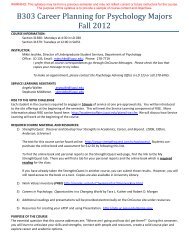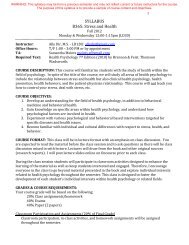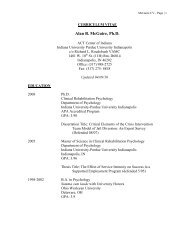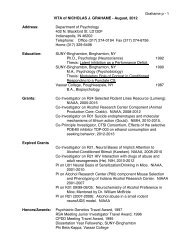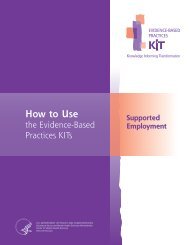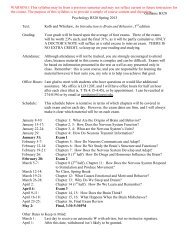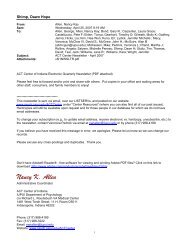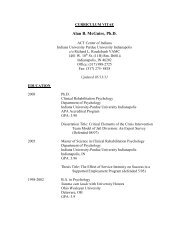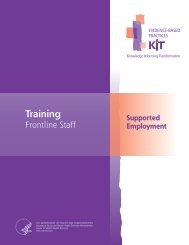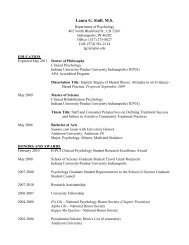ANGELA L. ROLLINS - Psychology @ IUPUI
ANGELA L. ROLLINS - Psychology @ IUPUI
ANGELA L. ROLLINS - Psychology @ IUPUI
You also want an ePaper? Increase the reach of your titles
YUMPU automatically turns print PDFs into web optimized ePapers that Google loves.
Curriculum Vitae<br />
<strong>ANGELA</strong> L. <strong>ROLLINS</strong><br />
Work<br />
Home<br />
ACT Center of Indiana<br />
(Address Provided Upon request)<br />
c/o Adult&Child Center<br />
Indianapolis, IN<br />
Wulsin Building<br />
222 E. Ohio Street, Rm 721<br />
Indianapolis, IN 46204<br />
Office: 317-275-8821 Cell: (317) 679-0434<br />
Fax: 317-275-8818 E-mail: ALROLLIN@<strong>IUPUI</strong>.EDU<br />
Employment/Education<br />
3/07 – present Research Director and Assistant Research Professor<br />
ACT Center of Indiana, Department of <strong>Psychology</strong><br />
Indiana University Purdue University Indianapolis (<strong>IUPUI</strong>), Indianapolis, IN<br />
Adult & Child Center, Indianapolis, IN<br />
3/05 – 3/07 Visiting Assistant Scientist/ACT and IMR Consultant and Trainer<br />
ACT Center of Indiana<br />
Indiana University Purdue University Indianapolis (<strong>IUPUI</strong>), Indianapolis, IN<br />
11/03- 3/05 Director of Research<br />
Thresholds Rehabilitation Centers, Chicago, IL<br />
7/02 – 11/03 Research Associate<br />
ACT Center of Indiana<br />
Indiana University Purdue University Indianapolis (<strong>IUPUI</strong>), Indianapolis, IN<br />
12/02 Ph.D., Clinical Rehabilitation <strong>Psychology</strong><br />
Indiana University Purdue University Indianapolis (<strong>IUPUI</strong>), Indianapolis, IN<br />
Dissertation Title: Predictors of Interpersonal Relationships in the Workplace for People<br />
with Severe Mental Illness<br />
6/01 – 7/02 Clinical <strong>Psychology</strong> Intern<br />
Adult/Severe Mental Illness Track<br />
Department of Psychiatry, Center for Mental Health Services Research<br />
University of Maryland School of Medicine, Baltimore, MD<br />
12/99 M.S., Clinical Rehabilitation <strong>Psychology</strong><br />
Indiana University Purdue University Indianapolis (<strong>IUPUI</strong>), Indianapolis, IN<br />
Thesis Title: Characteristics of Coping with the Positive and Negative Symptoms of<br />
Schizophrenia<br />
5/96 B.S., <strong>Psychology</strong> (summa cum laude)<br />
School of Social Science<br />
Xavier University, Cincinnati, OH
Awards and Fellowships<br />
Early Career Research Award, IAPSRS, 2004<br />
Outstanding Student Award, Clinical Rehabilitation <strong>Psychology</strong>, <strong>IUPUI</strong>, 2001<br />
Travel Fellowship, Graduate Office Fellowship Committee, <strong>IUPUI</strong>, 2001, 1998<br />
GSC Symposium Poster Award, Graduate Student Council, <strong>IUPUI</strong>, 1999<br />
Educational Enhancement Grant, Graduate Student Organization, <strong>IUPUI</strong>, 1997<br />
Rehabilitation Services Administration Training Fellowship, <strong>IUPUI</strong>, 1997-1998<br />
University Fellowship, <strong>IUPUI</strong>, 1996-1997<br />
LaGrange Award for Excellence in <strong>Psychology</strong>, <strong>Psychology</strong> Department, Xavier University, 1996<br />
Professional Affiliations and Committee Activities<br />
Chair, Research Committee, United States Psychiatric Rehabilitation Association (USPRA, formerly the<br />
International Association of Psychosocial Rehabilitation Services), 2008-2009; Co-chair 2007-2008;<br />
Member 2004- present.<br />
Ad hoc reviewer, Administration and Policy in Mental Health and Mental Health Services Research, 2007-<br />
2008<br />
Ad hoc reviewer, Psychiatric Rehabilitation Journal, 2008-2009<br />
Ad hoc reviewer, American Journal of Psychiatric Rehabilitation, 2007-2008<br />
Ad hoc reviewer, Journal of Vocational Rehabilitation, 2006-2007<br />
Member, Thresholds Institutional Review Board, 2003-2005<br />
Member, John Howard Association Collaborative on Mental Health and Criminal Justice, 2003-2005<br />
Faculty Member, Chicago Consortium for Stigma Research, 2003-2005<br />
Ad hoc reviewer, Journal of Mental Health, 2003, 2005<br />
Student affiliate, American Psychological Association (APA), 1996-2003<br />
<strong>Psychology</strong> Representative, <strong>IUPUI</strong> School of Science Graduate Student Council, 1997-98<br />
Current Grant Support<br />
2008-2011 Evaluator (20% time), Enhanced IMPACT: Integration of Outreach, Primary Care, and<br />
Community Mental Health Services, Substance Abuse and Mental Health Services<br />
Administration (SAMHSA) 1H79SM058620-01 ($1,234,554). Project Supervisor: R. M.<br />
McKasson, M.A.<br />
2008-2009 Co-investigator (10% time), Impact of Illness Management and Recovery (IMR) on Hospital<br />
Utilization: A Retrospective Cohort Study, US Outcomes Research Department (Bristol-<br />
Myers Squibb) ($71,418). P.I.: M. P. Salyers, Ph.D.<br />
2007-2012 Co-Investigator (60% time), Recovery Oriented Assertive Community Treatment, National<br />
Institute of Mental Health (NIMH) 1 R24 MH074670-01A2 ($2,505,813). P.I.: M. P.<br />
Salyers, Ph.D.<br />
2007-2010 Co-investigator (10% time), ACT Center of Indiana, <strong>IUPUI</strong> Signature Center ($300,000).<br />
P.I.: M. P. Salyers, Ph.D.<br />
2005-2009 Research Director (10%, contributed) (2007-present), Consultant and Trainer (2005-2007),<br />
State-Wide Assertive Community Treatment Technical Assistance Center, Indiana Division<br />
of Mental Health and Addiction (DMHA) ($2,096,320). P.I.: M. P. Salyers, Ph.D.<br />
Prior Grant Activity<br />
2005-2007 Co-investigator, Consultant and Trainer, Implementing and Evaluating IMR in Indiana,<br />
SAMHSA SM56140 ($789,834). P.I.: C. R. Boyle<br />
2003, 2005-07 Co-investigator, Consultant and Trainer, Integrating Assertive Community Treatment (ACT)<br />
and Illness Management and Recovery (IMR) for Clients with Severe Mental Illness (SMI),<br />
National Institute of Disability and Rehabilitation Research (NIDRR) H133G030106<br />
($448,917). P.I.: M. P. Salyers, Ph.D.
2004-2005 Evaluator, Thresholds Metro West Access Project, SAMHSA TI16473 ($1,989,268). P.I.: J<br />
Mayes, D. Howard-Frye.<br />
2004-2005 Evaluator, Thresholds Prison Project: Chicago Community Trust and Susan Buffet<br />
Foundation ($100,000). Program Directors: John Fallon, Peggy Flaherty.<br />
2002-2003 Implementation Monitor, National Evidence-Based Practice Project: SAMHSA. ($91,693).<br />
PI: G. R. Bond.<br />
2003 Evaluator, Community Action Initiative to Implement Integrated Dual Disorders<br />
Treatment: Phase II, SAMHSA SM55976 ($149,818). P.I.: G. R. Bond, Ph.D.<br />
2002-2003 Evaluation Assistant, Community Action Initiative to Implement Integrated Dual Disorders<br />
Treatment: Phase I, SAMHSA SM54539 ($150,000). P.I.: G. R. Bond, Ph.D.<br />
Publications<br />
Rollins, A. L., Bond, G. R., Lysaker, P. H., McGrew, J. H., & Salyers, M. P. (in press). Coping with<br />
positive and negative symptoms of schizophrenia. American Journal of Psychiatric Rehabilitation.<br />
Salyers, M. P., Matthias, M. S., Spann, C., Lydick, J., Rollins, A. L., & Frankel, R.M. (in press).<br />
The role of patient activation in psychiatric visits. Psychiatric Services.<br />
Tsai, J., Salyers, M. P., Rollins, A. L., McKasson, R. M., & Litmer, M. L. (2009). Integrated Dual<br />
Disorders Treatment. Journal of Community <strong>Psychology</strong>, 37 (6), 781-788.<br />
Salyers, M. P., Godfrey, J. L., McGuire, A. B., Gearhart, T., Rollins, A. L., & Boyle, C. (in press).<br />
Implementing illness management and recovery for consumers with severe mental illness. Psychiatric<br />
Services.<br />
Salyers, M.P., Rollins, A.L., McGuire, A.B., & Gearhart, T. (2009). Barriers and Facilitators in<br />
Implementing Illness Management and Recovery for Consumers with Severe Mental Illness: Trainee<br />
Perspectives. Administration and Policy in Mental Health and Mental Health Services Research, 36, 102-<br />
111.<br />
Harding, B., Torres-Harding, S., Bond, G. R., Salyers, M. P., Rollins, A. L., Hardin, T. (2008).<br />
Factors associated with early attrition from psychosocial rehabilitation programs. Community Mental Health<br />
Journal, 44 (4), 283-288.<br />
Salyers, M. P., McGuire, A. B., Bond, G. R., Hardin, T., Rollins, A. L., Harding, B., & Haines, M.<br />
(2008). What makes the difference? Understanding success and failure in two effective psychiatric<br />
rehabilitation approaches. Journal of Vocational Rehabilitation, 28, 105-114.<br />
Salyers, M. P., Rollins, A. L., Bond, G. R., Tsai, J., Moser, L. & Brunette, M. F. (2007).<br />
Development of a scale to assess practitioner knowledge in providing integrated dual disorders treatment.<br />
Administration and Policy in Mental Health, 34, 570-581.<br />
Salyers, M. P., McKasson, M., Bond, G. R., McGrew J. H., Rollins, A. L., & Boyle, C. (2007). The<br />
role of technical assistance centers in implementing evidence-based practices: Lessons learned. American<br />
Journal of Psychiatric Rehabilitation, 10(2), 85-101.<br />
Davis, K. E., Devitt, T., Rollins, A., O’Neill, S., Pavick, D., & Harding, B. (2006). Integrated<br />
residential treatment for persons with severe and persistent mental illness: Lessons in recovery. Journal of<br />
Psychoactive Drugs, 38(3), 263-272.<br />
Rollins, A. L., O’Neill, S. J., Davis, K. E., & Devitt, T. S. (2005). Substance abuse relapse and<br />
factors associated with relapse in an inner-city sample of patients with dual diagnoses. Psychiatric Services,<br />
56(10), 1274-1281.<br />
Lurigio, A. J., Rollins, A., & Fallon, J. (2004). The effects of serious mental illness on offender reentry.<br />
Federal Probation, 68(2), 45-52.<br />
Bond, G. R., Salyers, M. P., Rollins, A. L., & Moser, L. L. (2005). The future of ACT. In C. L.<br />
Mulder & H. Kroon (Eds.), Assertive community treatment: Evidence-based bemoeizorg voor patiënten met<br />
ernstige psychiatrische aandoeningen. Arnhem, The Netherlands: Cure & Care Publishers.
Moser, L., DeLuca, N., Rollins, A. L., & Bond, G. R. (2004). Implementing evidence-based<br />
psychosocial practices: Lessons learned from statewide implementation of two practices. CNS Spectrums,<br />
9, 926-936.<br />
Bond, G. R., Salyers, M. P., Rollins, A. L., Rapp, C. A., & Zipple, A. M. (2004). How evidencebased<br />
practices contribute to community integration. Community Mental Health Journal, 40(6), 569-588.<br />
Koop, J. I., Rollins, A. L., Bond, G. R., Salyers, M. P., Dincin, J., Kinley, T., Shimon, S., &<br />
Marcelle, K. (2004). Development of the DPA Fidelity Scale: Using fidelity to define an existing vocational<br />
model. Psychiatric Rehabilitation Journal, 28(1), 16-24.<br />
Goldberg, R. W., Rollins, A. L., & McNary, S. W. (2004). The Working Alliance Inventory:<br />
Modification and use with people with serious mental illnesses in a vocational rehabilitation program.<br />
Psychiatric Rehabilitation Journal, 27(3), 267-270.<br />
Goldberg, R. W., Rollins, A. L., & Lehman, A. F. (2003). Social network correlates among people<br />
with psychiatric disabilities. Psychiatric Rehabilitation Journal, 26(4), 393-402.<br />
Rollins, A. L., Mueser, K. T., Bond, G. R., & Becker, D. R. (2002). Social relationships at work:<br />
Does the employment model make a difference? Psychiatric Rehabilitation Journal, 26(1), 51-62.<br />
Rollins, A. L., & Bond, G. R. (2001). Doctoral education in psychiatric rehabilitation.<br />
Rehabilitation Education, 15(2), 177-190.<br />
Rollins, A. L., & Bond, G. R. (2001). <strong>Psychology</strong> curriculum and psychiatric rehabilitation.<br />
Psychiatric Rehabilitation Skills, 5(3), 514-533.<br />
Lysaker, P. H., Marks, K. A., Picone, J. B., Rollins, A. L., Fastenau, P. S., & Bond, G. R. (2000).<br />
Obsessive and compulsive symptoms in schizophrenia: clinical and neurocognitive correlates. Journal of<br />
Nervous and Mental Disorders, 188(2), 78-83.<br />
Harrington, S., Shermis, M. D., & Rollins, A. L. (2000). The influence of word processing on<br />
English placement test results. Computers and Composition, 17, 197-210.<br />
Works in Progress<br />
Rollins, A. L., Salyers, M. P., Tsai, J., & Lydick, J. M. (under review). Staff turnover in statewide<br />
implementation of ACT: relationship with ACT fidelity and other team characteristics.<br />
Salyers, M. P., McGuire, A. B., Rollins, A. L., Bond, G. R., & Mueser, K. T. (under review).<br />
Integrating Assertive Community Treatment and Illness Management and Recovery for Consumers with<br />
Severe Mental Illness.<br />
Matthias, M. S., Salyers, M. P., Rollins, A. L., & Frankel, R. M. (under review). Decision Making<br />
in Psychiatric Consultations.<br />
Unpublished Manuscripts<br />
Rollins, A. L. (December 2002). Predictors of interpersonal relationships in the workplace for<br />
people with severe mental illness. Doctoral Dissertation. Indianapolis, IN: Indiana University-Purdue<br />
University Indianapolis.<br />
Salyers, M. P., Rollins, A. L., Evans, L. J., & Bond, G. R. (2000). Program guidelines of New York<br />
State assertive community treatment programs. (Report to the New York State Office of Mental Health).<br />
Indianapolis, IN: Indiana University-Purdue University Indianapolis.<br />
Evans, J. D., Svanum, S., Bond, G. R., Losee, L. N., Rollins, A., & Wright, D. E. (1999). Final<br />
report to the Division of Mental Health: Township trustee study (Report to the Indiana Division of Mental<br />
Health). Indianapolis, IN: Indiana University-Purdue University Indianapolis.<br />
Evans, J. D., Svanum, S., Bond, G., Rollins, A., Wright, D., Ventura, T., & Resnick, S. (1999).<br />
Preliminary report to the Division of Mental Health: Township trustee study phase I (Report to Indiana<br />
Division of Mental Health). Indianapolis, IN: Indiana University-Purdue University Indianapolis.<br />
Rollins, A. L. (August 1999). Characteristics of coping with the positive and negative symptoms of<br />
schizophrenia. Master’s Thesis. Indianapolis, IN: Indiana University-Purdue University Indianapolis.
Bond, G., Resnick, S., Evans, L., Rollins, A., & Wright, D. (1998). Evaluation of CONNECT98<br />
(Final Report to Illinois Office of Mental Health). Indianapolis, IN: Indiana University-Purdue University<br />
Indianapolis.<br />
Bond, G.R., Meyer, P., Rollins, A., McCoy, M., Herbeck, D., & Rowan, D. (1998). The impact of<br />
atypical antipsychotics on vocational outcomes in a psychiatric rehabilitation agency (Final Report to Eli<br />
Lilly). Indianapolis, IN: Indiana University-Purdue University Indianapolis.<br />
Bond, G. R., Resnick, S. G., Rollins, A. L., & Fekete, D. (1997). Final Report: Indiana Human<br />
Services Training Project. USDE Grant #H129H00007.<br />
Presentations at National Conferences<br />
Bowman, A., Ramos, J., & Rollins, A. L. (June 5, 2009). Forensic ACT: Outcomes and<br />
implications for model development. Presentation at 25th Annual Assertive Community Treatment<br />
Association Conference, Washington, D. C.<br />
Rollins, A. L., Blackman, E., & Salyers, M. P. (August 28, 2008). Recovery Oriented Assertive<br />
Community Treatment Teams. WEBINAR presented for the Homelessness Resource Center.<br />
Rollins, A. L., Thom, J., Hicks, L. J., & Gilbert, T. (June 24, 2008). The assertive community<br />
treatment model for seriously mentally ill offenders (Parts I and II). Presentation at the National Mental<br />
Health Conference: Managing Mental Health from Corrections to Community, Indiana Department of<br />
Corrections, Indianapolis, IN.<br />
Rollins, A. L., Thomas, D., & Shimp, D. (June 16, 2008). Illness Management and Recovery on<br />
ACT teams: Perspectives of consumers as practitioners and recipients of care. Presentation at the annual<br />
USPRA conference, Lombard, IL.<br />
Rollins, A. L., & Hicks, L. J. (May 14, 2008). Monitoring Fidelity of ACT Implementation using<br />
the DACTS. Presentation at the annual ACTA Conference, Indianapolis, IN.<br />
Rollins, A. L. (August 28, 2006). IMR quality improvement in Indiana. Presentation at the<br />
SAMHSA/NASMHPD Lessons Learned: Embedding Evidence-Based Practices in Statewide<br />
Transformation Conference, Arlington, VA.<br />
Rollins, A. L. (April 17, 2006). ACT implementation: Indiana’s experience. Presentation at<br />
NASMHPD/NIMH/SAMHSA Science to Service Conference, Oklahoma City, OK.<br />
Rollins, A. L. (January 27, 2006). Dual disorders treatment philosophy. Presentation at NEPECsponsored<br />
SN-CMI Program Meeting, San Diego, CA.<br />
Rollins, A. L., Fallon, J., Zipple, A. M., Pavick, D. (May 2004). An Update on the Thresholds Jail<br />
Project and Innovations for the Future. Presentation at Annual GAINS Conference, Las Vegas, NV.<br />
Rollins, A.L. (May 2004). Positive social experiences in the workplace. Presentation at annual<br />
IAPSRS Conference, San Diego, CA.<br />
Hicks, L. J., Salyers, M. P., & Rollins, A. L. (June 2003). Critical Steps to Creating a Successful<br />
ACT Team. Presentation at Annual ACTA Conference, San Antonio, TX.<br />
Rollins, A. L., Mueser, K. T., Bond, G. R., & Becker, D. R. (April 2001). Workplace social<br />
networks in two employment programs for people with severe mental illness. Presentation at the<br />
International Congress on Schizophrenia Research, Whistler, BC.<br />
Rollins, A. L., Bond, G. R., & Salyers, M. P. (October 2000). Interpersonal relationships on the job:<br />
Does the employment program make a difference? Presentation at the 4 th Biennial Research Seminar on<br />
Work by MRI/UPENN Rehabilitation Research and Training Center, Philadelphia, PA.<br />
Rollins, A. L., Bond, G.R., and Lysaker, P.H. (April 1999). Characteristics of coping with the<br />
symptoms of schizophrenia. Presentation at the International Congress on Schizophrenia Research, Santa Fe,<br />
NM.<br />
Rollins, A. L. (April 1996). The effects of derogatory humor on aggression: A study based on<br />
gender. Presentation at the Tenth National Conference of Undergraduate Research, Asheville, NC.
Presentations at Regional Conferences<br />
Malott, J., Skeel, T., & Rollins, A. (December 2006). Team Darwinsim. Presentation at the annual<br />
meeting of Indiana Association for Persons in Supported Employment, Indianapolis, IN.<br />
Rollins, A. L. (September 2006). Overview of evidence-based practices in Indiana. Presentation at<br />
the annual meeting of Indiana County Community Corrections officials, Indianapolis, IN.<br />
Rollins, A. L. (November 2005). ACT Basic Training. Presentation for the Adult Mental Health<br />
Division, Hawaii Department of Health, Honolulu, HI.<br />
Rollins, A. L. (September 2005). Illness Management and Recovery. Presentation at the 16 th<br />
Annual Mental Health Institute, Kentucky Division of Mental Health and Substance Abuse Services,<br />
Louisville, KY.<br />
Rollins, A. L. (September 2005). ACT Implementation: Indiana’s Experience. Panel Presentation<br />
at the 16 th Annual Mental Health Institute, Kentucky Division of Mental Health and Substance Abuse<br />
Services, Louisville, KY.<br />
Rollins, A. L. (April 2005). Assertive Community Treatment. Teleconference Presentation to the<br />
American Therapeutic Recreation Association.<br />
Rollins, A. L. (January 2004). National EBP Project: Lessons in IDDT Implementation.<br />
Presentation at the MISA Toolkit in Action Conference, Chicago Behavioral Health Association, Chicago,<br />
IL.<br />
Rollins, A. L. (December 2003). ACT Enhancements. Presentation at the Intensive Weekend<br />
Workshop for the Indiana Consortium for Mental Health Services Research, Indianapolis, IN.<br />
Salyers, M. P., & Rollins, A. L. (October 2003). Update on ACT and IDDT Implementation in<br />
Indiana. Presentation at NAMI Indiana Annual Conference, Indianapolis, IN.<br />
Rollins, A. L. (September 2003). Integrated Dual Disorders Treatment & Illness Management and<br />
Recovery. Presentation at Annual Conference, KEY Consumer Organization, Indianapolis, IN.<br />
Rollins, A. L., & Bond, G. R. (July 2003). Integrated Dual Disorders Treatment: Measuring<br />
Fidelity of Implementation. Presentation at Bi-annual Conference, Indiana Department of Mental Health and<br />
Addiction, Indianapolis, IN.<br />
Rollins, A. L. (February 2003). Implementing Evidence-based Practices: Consumers with Severe<br />
Mental Illness. Presentation to the Consumer Advisory Council to the Governor’s Commission on Home<br />
and Community-based Services, Indianapolis, IN.<br />
Haines, M., Bond, G. R., Mueser, K. T., & Rollins, A. L. (2000, November 17). A randomized<br />
controlled trial study of the Individual Placement and Support model of supported employment. Presentation<br />
at the Illinois IAPSRS Chapter Statewide Conference, Matteson, IL.<br />
Shimon, S., Rollins, A. L., & Bond, G. R. (December 1999). Comparison of two employment<br />
models for people with SMI. Presentation at the 20 th Annual Special Populations Institute, Illinois<br />
Department of Human Services, Champaign, IL.<br />
Rollins, A. L. (November 1999). Coping with symptoms of schizophrenia. Presentation at the<br />
Third Annual <strong>IUPUI</strong> School of Science Graduate Student Council Research Symposium, Indianapolis, IN.<br />
Rollins, A. L. (March 1996). Gender differences in derogatory humor and aggression.<br />
Presentation at the Xavier University Celebration of Student Research, Cincinnati, OH.<br />
University or Agency-level Seminar/Lectures<br />
Rollins, A. L. (May 2007). Assertive Community Treatment in Indiana. Guest lecture for the<br />
Social Justice Group, SS Peter and Paul Cathedral, Indianapolis, IN.<br />
Rollins, A.L. (April 2007). Monitoring Fidelity of EBP Implementation. All day seminar and<br />
demonstration of EBP fidelity measurement, focusing on the DACTS, Oakland County Mental Health<br />
Association, Auburn Hills, MI.<br />
Rollins, A. L. (February 2007). Fidelity and Process Evaluation. Guest lecture for Topics in<br />
Translational and Implementation Research course, Regenstrief Institute, Indianapolis, IN.
Rollins, A. L. (October 2006). Illness Management and Recovery. Guest lecture for Psychiatric<br />
Rehabilitation graduate level psychology course, <strong>IUPUI</strong>, Indianapolis, IN.<br />
Rollins, A. L. (March, October 2004). How to write an article for publication. Internal agency<br />
training and Staff Development Day, Thresholds, Chicago, IL.<br />
O’Neill, S.J. & Rollins A. L. (November 2004). Overview of evidence-based practices and<br />
organizational elements supporting implementation. Internal agency training to All Agency Directors<br />
Meeting, Thresholds, Chicago, IL.<br />
Rollins, A. L. (June 2004). Relapse rates and correlates of relapse in people with mental illness and<br />
co-occurring substance use disorders. Seminar on relapse prevention for people with SMI and co-occurring<br />
substance use disorders, NH-Dartmouth Psychiatric Research Center, Lebanon, NH.<br />
Rollins, A. L. (February 2004). Basic data analysis and interpretation of results using SPSS.<br />
Internal agency training, Thresholds, Chicago, IL.<br />
Rollins, A. L. (February 2004). Database management using SPSS. Internal agency training,<br />
Thresholds, Chicago, IL.<br />
Rollins, A. L. & McCammant, K. (May 2002). Special Offenders Clinic: Introduction and case<br />
presentation. Grand Rounds Lecture for the Department of Psychiatry, University of Maryland School of<br />
Medicine, Baltimore, MD.<br />
Rollins, A. L. (April 1999; April 2000; March 2001; April 2003). Completing your thesis: Tips<br />
for success. Guest lecture for Field Methods graduate level psychology course, <strong>IUPUI</strong>, Indianapolis, IN.<br />
Rollins, A. L. (November 1999). Coping with positive and negative symptoms of schizophrenia.<br />
Paper presented to the <strong>IUPUI</strong> <strong>Psychology</strong> Department, Indianapolis, IN.<br />
Panel Participation<br />
Rollins, A. L. (October 21, 2005). Illness Self-Management & Recovery Expert Panel. Panel<br />
participation for the National GAINS Center for Evidence-Based Programs in the Justice System, Policy<br />
Research Associates, Inc, Bethesda, MD.<br />
Consultation Experience (Extended/Ongoing)<br />
Veterans Administration Feasibility Study for Assessing Fidelity to the ACT Model as Implemented<br />
in VA’s MHICM program<br />
VA Northeastern Program Evaluation Center, West Haven, CT 7/08-present<br />
VA Investigators: Robert A. Rosenheck, M.D.; Michael Neal, Ph.D<br />
IU Investigators/consultants: Angela L. Rollins, Ph. D., John McGrew, Ph. D., Michelle P. Salyers, Ph. D..<br />
Co-investigator and ACT Fidelity consultant: Providing onsite and phone assessments for 4 participating<br />
VA MHICM teams to assess the feasibility of a phone fidelity protocol to be tested in a larger study.<br />
Assertive Community Treatment (ACT) Consultation (multiple clients)<br />
Adult Mental Health Division, Hawaii Department of Health, Honolulu, HI 11/05; Contact: Kathleen<br />
Yoshitomi<br />
Oakland County Mental Health Authority, MI 4/07; Contact Erin McRobert<br />
Maccomb County Mental Health Authority, MI 6/07;Contact Jim Wargel<br />
Baltimore City Health Department (SAMHSA grantee), 7/08; Contact Sylvia Pines (JBS, International) or<br />
Betty Kavanaugh (Baltimore City Department of Health)<br />
Network 180, Grand Rapids, MI 7/08; Contact Kathy Freberg and Ruth Sprague<br />
Consultant and Trainer: In Hawaii, provided a regional one-day basic training for clinical staff and state<br />
officials on the ACT model, conducted baseline fidelity assessments and reports for 2 ACT teams, using the<br />
Dartmouth Assertive Community Treatment Scale (DACTS). Provided a feedback session with each<br />
agency’s staff and state officials to go over recommendation for improving model implementation. Also<br />
consulted throughout the week with state officials regarding their plans for supporting model
implementation at the state level through fidelity and outcome monitoring, other forms of technical<br />
assistance, and financing and regulation of the model. In Oakland county, provided a one-day training on<br />
how ACT fidelity assessment. In Maccomb county, conducted a DACTS assessment and provided feedback<br />
to the team and county officials. In Baltimore, did a 3-day training for a SAMHSA grantee using ACT for<br />
persons who are homeless with mental illness and/or substance use disorders on DACTS assessment, ACT<br />
basic, with emphasis on dual disorders interventions (e.g., motivational interventions). In<br />
Illness Management and Recovery (IMR) Consultation (multiple clients)<br />
Central Clinic, Cincinnati, OH 12/05, 9/06, 11/07; Contact: Nelly Rimini<br />
NORCEN, Cincinnati OH 10/06, 11/07; Contact: Joan Wyler, Maurey Ripley<br />
Centerpoint Health (formerly Core Behavioral Health), Cincinnati, OH: 8/07 – present; Contact Meghan<br />
Sweeney<br />
Consultant and Trainer: Provided a two-day basic training for clinical staff designated to implement IMR.<br />
Also conducted fidelity assessments and wrote reports for each program, with suggestions for improving<br />
model implementation. Providing Centerpoint with ongoing training and consultation.<br />
Veterans Administration Special Needs-Chronically Mental Ill Project<br />
VA Northeastern Program Evaluation Center, West Haven, CT 5/05-present<br />
Principle Investigator: Robert A. Rosenheck, M.D.; Project Director: Wesley J. Kasprow, Ph.D., M.P.H<br />
Clinical Trainer: Providing site-level training and consultation to 3 VA special needs programs serving<br />
homeless veterans with severe mental illness and co-occurring substance use disorders in the San Francisco,<br />
Oakland, Palo Alto/San Jose, Little Rock, and Salt Lake City areas. The program includes components of<br />
the Critical Time Intervention for assertive case management, specialized transitional housing and housing<br />
placement services, stagewise and motivational interventions for dual disorders, the Vet-to-Vet peer support<br />
program, and a money management intervention. Provided two days of onsite initial training and<br />
consultation through periodic conference calls for clinical case consultation as the project continues, as well<br />
as semi-annual site visits and reports for sustained implementation and suggestions for program<br />
improvement.<br />
Assertive Community Treatment (ACT) Consultation<br />
ACT Center of Indiana, <strong>IUPUI</strong>, Indianapolis, IN 2/05–3/07<br />
Supervisor: Michelle P. Salyers, Ph.D.<br />
Consultant and Trainer: Providing site-level consultation with Indiana community mental health centers<br />
regarding ACT implementation. Work with administrators and team leaders regarding organizational issues<br />
in implementation, as well as Indiana certification standards and Medicaid and other reimbursement<br />
mechanisms. Conduct DACTS assessments and prepare fidelity reports to guide implementation and<br />
program improvement, as well as helping teams to monitor quarterly outcomes reports. Work with<br />
individual clinicians and the team as a whole regarding their role functions and core team processes (e.g.,<br />
assessment, treatment planning, engagement). Also help establish and provide ACT basic training at the<br />
regional level each quarter (duty rotated among all ACT Center trainers).<br />
Illness Management and Recovery (IMR) Consultation<br />
ACT Center of Indiana, <strong>IUPUI</strong>, Indianapolis, IN 2/05–3/07<br />
Supervisor: Michelle P. Salyers, Ph.D.<br />
Consultant and Trainer: Providing site-level consultation with Indiana community mental health centers<br />
regarding IMR implementation. Work with administrators and team leaders regarding organizational issues<br />
in implementation. Conduct IMR fidelity assessments and prepare fidelity reports to guide implementation<br />
and program improvement. Consult with participating administrators and IMR clinicians (both consumer<br />
providers and non-consumer providers) regarding basic clinical skills required by the model: educational,<br />
cognitive-behavioral, and motivational techniques. Along with the center’s co-Director and consumer<br />
trainer, establish and provide IMR basic training curriculum (2 day) at the regional level, as needed.
Clinical Experience<br />
Clinical <strong>Psychology</strong> Internship, Adult/Severe Mental Illness Track<br />
Training Director: Laurel Kiser, Ph.D., M.B.A., Center for Mental Health Services Research, University of<br />
Maryland School of Medicine, Baltimore, MD, 6/01 – 7/02<br />
Supervisors: Alan Bellack, Ph.D., Eileen Locklear, Ph.D., Melanie Bennett, Ph.D., Kevin McKamant,<br />
Ph.D., & James Fleming, Ph.D.<br />
APA-accredited internship focused on preparing psychology interns for academic careers. Clinical work<br />
includes psychotherapy, assessment and case management for inner-city clients with severe mental illness<br />
(and often co-occurring substance abuse); behavioral skills training for clients with a dual diagnosis of SMI<br />
and substance abuse; manualized social skills training groups within psychosocial clubhouse setting; and<br />
group treatment for court-ordered sex offenders.<br />
Practicum, Indiana Women’s Prison<br />
Supervisor: Jeff Speiden, Ph.D., Indianapolis, IN, 8/00 – 12/00<br />
Special Needs Unit and Intake Unit of a state prison. Served incarcerated offenders with mental disorders<br />
through individual therapy, psychoeducational group therapy on self-esteem and physical wellness, and<br />
intakes and assessments on newly admitted offenders. Client diagnoses included substance use disorders,<br />
PTSD, borderline personality disorder, bipolar disorder, major depression, ADHD, and schizophreniaspectrum<br />
disorders.<br />
Practicum, Larue D. Carter Memorial Hospital, Department of Youth Services<br />
Supervisor: George Karwisch, Ph.D., Indianapolis, IN, 1/00 – 6/00<br />
Inpatient unit for adolescents with a broad range of psychiatric, developmental, and behavioral disorders.<br />
Conducted individual therapy and family therapy. Co-lead healthy living group therapy. Wrote integrated<br />
assessment reports for new intakes. Participated in interdisciplinary team meetings for treatment plan<br />
review and patient care monitoring. Diagnoses included schizophrenia, PTSD, borderline personality<br />
disorders, conduct disorder, oppositional defiant disorder, Asperger’s disorder, mild MR, LD, and substance<br />
use.<br />
Practicum, Indiana Alzheimer’s Disease Center<br />
Supervisor: Fred Unverzagt, Ph.D., Department of Psychiatry, Indiana University School of Medicine,<br />
Indianapolis, IN, 9/99 – 12/99<br />
Outpatient neuropsychological consultation for psychiatry, neurology, and rheumatology patients and<br />
outside referrals (self-referred, insurance companies, worker’s compensation claims, etc.). Observed and<br />
conducted clinical interviews and neuropsychological testing, wrote psychological reports to referring<br />
physicians. Diagnoses included Alzheimer’s disease and other dementias, mild cognitive impairments, LD,<br />
personality disorders, major depression, bipolar disorder, anxiety disorder, and medical illnesses, such as<br />
Lupus, fibromyalgia, cancer, and diabetes<br />
Practicum, Midtown Community Mental Health Center<br />
Supervisor: Robert Glueckauf, Ph.D., Indianapolis, IN, 2/98 – 7/98<br />
Participated in four rotations at this community mental health center serving urban Indianapolis. In<br />
supported employment rotation, observed and participated in strengths assessment for vocational placement,<br />
job development, job coaching, and follow-along case management. In addictions rotation, observed and<br />
conducted substance use disorder assessment and consultation on general medical floors at Wishard<br />
Memorial Hospital. Co-lead family sessions for adolescents and process-oriented intensive outpatient groups<br />
required by the Marion County Courts, and psychoeducational groups for dual diagnosis clients with SMI<br />
and pregnant/parenting addicted mothers. Participated in substance use assessments for inmates in county<br />
jail and intake interviews at the Methadone clinic. Also attended and participated in various program
planning meetings for a jail diversion program through the county prosecutor’s office and an addictions<br />
treatment curriculum. Created an outcomes assessment database for the evaluation of a new outpatient<br />
detoxification program. In Clubhouse rotation, observed and conducted both psychoeducational and<br />
process-oriented groups concerning self-esteem and interpersonal skills. On Assessment Team rotation,<br />
conducted comprehensive intakes for the mental health center and numerous case reviews at state hospitals<br />
to assess readiness for release into the community. Participated in weekly staffing on this multidisciplinary<br />
team. Presenting problems/diagnoses included schizophrenia-spectrum disorders, mood disorders, severe<br />
personality disorders, and substance use disorders, as well as neurological conditions such as Huntington’s<br />
disease and AIDS dementia.<br />
Practicum, Counseling and Psychological Services<br />
Supervisors: John Sharp, Ed.D., Linda Alexander, Psy.D., John McGrew, Ph.D., John Guare, Ph.D.,<br />
Unchana Thamasak, M.Ed., <strong>IUPUI</strong>, Indianapolis, IN, 9/96 – 2/98<br />
Conducted intakes and psychotherapy in a university counseling center. Also conducted a two-hour<br />
workshop on stress and time management. Presenting problems included depression, adjustment issues,<br />
relationship difficulties, marriage issues, PTSD, anxiety, and test anxiety.<br />
Psychoeducational Evaluation, Lawrence Metropolitan School District<br />
Supervisor: Mark Shermis, Ph.D., Indianapolis, IN, 9/96 – 5/97<br />
Conducted psychoeducational evaluations of high school students receiving special education services for<br />
learning disabilities and emotional handicaps. Administered, scored, interpreted, and wrote reports on tests<br />
of intelligence, memory, achievement, personality, and problem solving.<br />
Direct Care Staff, Ohio Valley Residential Services<br />
Cincinnati, OH, 9/95 - 8/96<br />
Provided supervision for adult male residents with developmental and psychiatric disabilities. Administered<br />
medication and conducted individual training on skills needed for daily living and vocational goals.<br />
Volunteer Staff, Pauline W. Lewis Center<br />
Cincinnati, OH, 2/95 – 12/95<br />
Worked directly with psychiatric patients in conjunction with nursing staff and activity therapist.<br />
Supervised activities and outings. Population was primarily geriatric patients with SMI.<br />
Research Assistantships (Graduate and Undergraduate)<br />
Employment Intervention Demonstration Project: SAMHSA<br />
Supervisor: Richard Goldberg, Ph.D., Center for Mental Health Services Research, University of Maryland<br />
School of Medicine, Baltimore, MD, 6/01 – 7/02<br />
Data Analyst: Project compared a psychosocial rehabilitation program and an individualized model of<br />
supported employment for people with SMI. Experiences include data analysis and manuscript preparation<br />
for two papers: the relationship between social networks and demographic, clinical and quality of life<br />
variables and a brief report on psychometric properties of the Working Alliance Inventory for SMI clients<br />
and their supported employment specialists.<br />
Supported Employment Study: NIMH<br />
Supervisor: Gary Bond, Ph.D, <strong>Psychology</strong> Department, <strong>IUPUI</strong>, Indianapolis, IN, 5/99 – 6/01<br />
Assistant Research Coordinator/Data Analyst: Project comparing the vocational and clinical outcomes, as<br />
well as cost effectiveness, of two employment models. Assisted in implementing the new intervention and<br />
the study itself, created a fidelity scale to measure program implementation of one of the models, data<br />
management, and data analysis. Monitored the Thresholds model for proper implementation and<br />
participated in research coordination meetings with clinical and research staff at Thresholds.
Evaluation of Assertive Community Treatment Programs: New York Office of Mental Health<br />
Supervisor: Michelle Salyers, Ph.D., <strong>Psychology</strong> Department, <strong>IUPUI</strong>, Indianapolis, IN, 1/00 – 12/00<br />
Data Analyst: Assisted in data analysis, interpretation of results, as well as preparing report on these results<br />
and making program guideline recommendations regarding ACT programs to the New York State OMH.<br />
Township Trustee Service Needs Analysis: Indiana Department of Mental Health<br />
Supervisors: Jovier Evans, Ph.D., Soren Svanum, Ph.D., & Gary Bond, Ph.D., <strong>Psychology</strong> Department,<br />
<strong>IUPUI</strong>, Indianapolis, IN, 11/98 – 9/99<br />
Project Coordinator: Assessed the service needs, service utilization patterns, and psychiatric/substance use<br />
diagnoses of clients of the Center Township Trustee in Marion County, IN. Duties involved study design<br />
and planning, contributing to the preliminary and final report to DMH, developing a local service utilization<br />
questionnaire, and conducting assessment interviews.<br />
Olanzapine and Vocational Outcomes Study: Eli Lilly & Co.<br />
Supervisors: Gary Bond, Ph.D. & Paul Lysaker, Ph.D., <strong>Psychology</strong> Department, <strong>IUPUI</strong>, Indianapolis, IN,<br />
8/98 – 6/99<br />
Research Assistant: Studied the effects of atypical antipsychotics on vocational outcomes. Trained other<br />
research assistants on clinical assessments, helped in coordination of study, data analysis and preparation of<br />
final report of study results to pharmaceutical company.<br />
Evaluating Connect98 Programs: Illinois Office of Mental Health<br />
Supervisor: Gary Bond, Ph.D., <strong>Psychology</strong> Department, <strong>IUPUI</strong>, Indianapolis, IN, 8/98 – 5/99<br />
Graduate Research Assistant: Program evaluation of psychosocial rehabilitation programs for clients with<br />
SMI, funded by Illinois’ Connect98 Initiative. Duties involved collecting, coding and analyzing survey data<br />
on the implementation of the Connect98 program. Also assisted in preparing the final report of study results<br />
and recommendations to OMH.<br />
Coping with the Symptoms of Schizophrenia: Thesis Research<br />
Supervisor: Gary Bond, Ph.D., <strong>Psychology</strong> Department, <strong>IUPUI</strong>, Indianapolis, IN, 5/97 – 9/99<br />
Independent Researcher: Interviewed clients with schizophrenia about how they cope with positive and<br />
negative symptoms of their illness, analyzed data, prepared thesis manuscript.<br />
Child Epilepsy and Neuropsychology Study: Epilepsy Foundation of America<br />
Supervisor: Philip Fastenau, Ph.D., <strong>Psychology</strong> Department, <strong>IUPUI</strong>, Indianapolis, IN, 5/97 – 10/97<br />
Graduate Research Assistant: Neuropsychological testing of children with epilepsy and sibling controls.<br />
Administered and scored a battery of tests with children ages 5 – 17.<br />
Indiana Human Services Training Project: Rehabilitation Services Administration<br />
Supervisor: Gary Bond, Ph.D., <strong>Psychology</strong> Department, <strong>IUPUI</strong>, Indianapolis, IN, 9/96 – 11/97<br />
Graduate Research Assistant: Project tested the effectiveness of training mental health consumers to work<br />
in human service agencies. Duties included conducting follow-up telephone interviews of former students,<br />
coding videotaped therapy sessions of consumer counselors on the use of basic therapeutic techniques,<br />
statistical analysis, and co-writing the final report for the project.<br />
Study of Word Processing and English Placement Test Results<br />
Supervisor: Mark Shermis, Ph.D., Testing Center, <strong>IUPUI</strong>, Indianapolis, IN, 5/97 – 10/97<br />
Graduate Research Assistant: Involved planning and executing data collection, as well as data analysis for<br />
research involving English placement exams at <strong>IUPUI</strong>. Also participated in liaison meetings between<br />
departments and report writing.
Factors in Case Management Utilization: Hamilton County Mental Health Board<br />
Supervisor: Alana Steffen, Ph.D., Cincinnati, OH, 1/96 - 8/96<br />
Research Assistant: Coordinated and participated in data collection for dissertation research being<br />
conducted by an Ohio University Ph.D. candidate in Clinical <strong>Psychology</strong>. Research duties involved working<br />
with the Hamilton County Mental Health Board, area hospitals, case management agencies, and other<br />
treatment agencies to recruit persons with severe mental illness referred for case management. Data<br />
collection involved administering a two-hour battery of questionnaires and psychological tests. The second<br />
phase of the data collection involved contacting case managers to obtain data on service utilization and<br />
functioning of the research participants.<br />
Humor and Aggression Research Project<br />
Supervisor: Cynthia Crown, Ph.D., <strong>Psychology</strong> Department, Xavier University, Cincinnati, OH, 5/95 - 6/96<br />
Research Assistant: Assisted social psychologist in all aspects of research. Duties included planning<br />
methodology, literature review, clerical duties, coordinating data collection efforts of other research<br />
assistants, data entry, data cleaning, and data analysis.<br />
Authoritarian Personality and Religious Culture<br />
Supervisor: Robert Kistler, Ph.D., <strong>Psychology</strong> Department, Andrews University, Berrien Springs, MI, 9/89 -<br />
5/90<br />
Research Assistant: Conducted a literature review and assisted in data collection on a research project as<br />
part of an undergraduate honors program.



